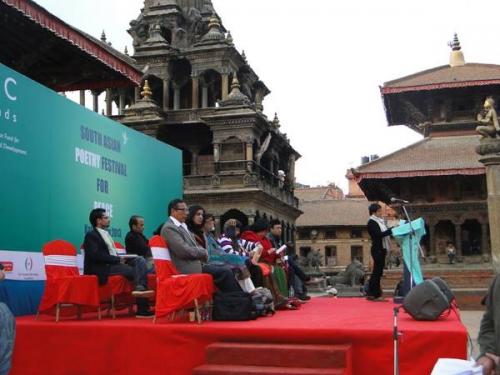Full Text Sharing
Categories:

South Asian Poetry Festival for Peace 2013: A Voice for Us All
Veneeta Singha, Kathmandu, December 8, 2013
Poetry! The word sparks a multitude of semantic responses - both cerebral and emotive. A poetry festival here in Kathmandu, I submit, is 'an idea whose time has come'. The South Asian Poetry Festival for Peace 2013 comes at an opportune moment for us to celebrate and honour the poets of our embattled region and their myriad, if hidden, contributions to the literary sphere as well as to our understanding and appreciation of the world.
"Death, be not proud, though some have called thee
Mighty and dreadful, for thou art not so;
For those whom thou think'st thou dost overthrow,
Die not, poor Death, nor yet canst thou kill me.
From rest and sleep, which but thy pictures be,
Much pleasure; then from thee much more must flow,
And soonest our best men with thee do go,
Rest of their bones, and soul's delivery."
Death, Be Not Proud, John Donne (1572-1631)
An acclaimed poet whom I studied with undeterred intensity and to whom I turn for solace, elucidation and company is TS Eliot. His poetic compositions, if read with any measure of contemplation, lay bare many intricacies and eternal verities of the human condition. Universality is yet another particularity attributed to Eliot's almost metaphysical poetic thought and intimations.
"Let us go then, you and I,
When the evening is spread out against the sky
Like a patient etherized upon a table;
Let us go, through certain half-deserted streets,
The muttering retreats ..."
The Love Song of J. Alfred Prufrock, TS Eliot (1888-1965)
Without attempting to confine and constrain any element of the poetic thought process through narrow, constrictive definitions, I glean here bits of a festival that few can resist. Poetry is, after all, the nadir of the literary imagination.
The Festival venue is the historic Patan Durbar Square - an ancient square yet an unambiguous conceit for contemporary Nepal. The gajur that embellishes and completes the temples in the square seemed a fitting metaphor for poetry itself. Chirag Bangdel, well-known Nepali artist and poet, welcomed the poets and guests with words and expressions I am unlikely to forget. He introduced the Festival as an avenue "to share poetry, sunshine and happiness: the good things in life." "Why do poets write poetry?"
As he began to discuss this art form, the wisdom of the ages seemed to flow. "Art is as important as the air we breathe." The Festival aims to "celebrate universal humanity; to rediscover the present beyond language, culture and passports." The Festival took three years to materialize and this seemed an apt simile for the times we live in - bound, as it often appears, by its own realization. "Poetry catalyzes change."
"Shanti hamro astitwa, shanti hamro adhikar!"
Abhaya and The Steam Injuns illuminated our journey into the poetry of South Asia with beautiful acoustic renditions. I can still hear her singing "Sakdina aba ma, Mandaina mero mann ..." In her lyrical words: it was not the summer sun but the winter sun - a friendly one. The day was bright, luminous and open.
The Festival brought together 20 poets from Bhutan, Sikkim, Bangladesh, India and Nepal. The first recital was by acclaimed Nepali poetess, Usha Sherchan. "Hamilai hamro haraeko Buddha chahinchha!"
For more information on the Festival, please visit: www.southasianpoetry.com










Add new comment